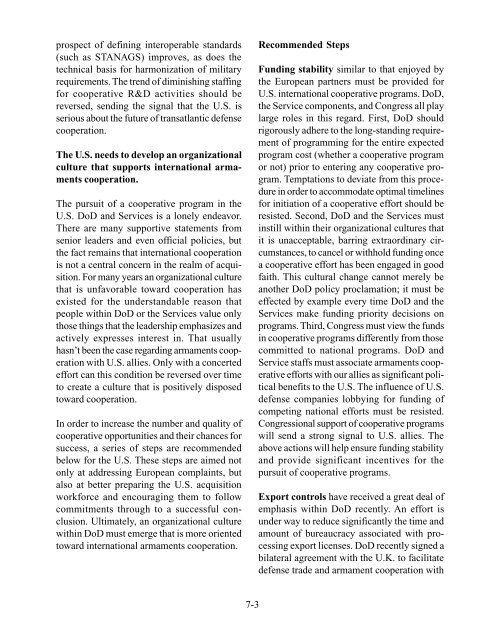Transatlantic Armaments Cooperation - Federation of American ...
Transatlantic Armaments Cooperation - Federation of American ...
Transatlantic Armaments Cooperation - Federation of American ...
Create successful ePaper yourself
Turn your PDF publications into a flip-book with our unique Google optimized e-Paper software.
prospect <strong>of</strong> defining interoperable standards<br />
(such as STANAGS) improves, as does the<br />
technical basis for harmonization <strong>of</strong> military<br />
requirements. The trend <strong>of</strong> diminishing staffing<br />
for cooperative R&D activities should be<br />
reversed, sending the signal that the U.S. is<br />
serious about the future <strong>of</strong> transatlantic defense<br />
cooperation.<br />
The U.S. needs to develop an organizational<br />
culture that supports international armaments<br />
cooperation.<br />
The pursuit <strong>of</strong> a cooperative program in the<br />
U.S. DoD and Services is a lonely endeavor.<br />
There are many supportive statements from<br />
senior leaders and even <strong>of</strong>ficial policies, but<br />
the fact remains that international cooperation<br />
is not a central concern in the realm <strong>of</strong> acquisition.<br />
For many years an organizational culture<br />
that is unfavorable toward cooperation has<br />
existed for the understandable reason that<br />
people within DoD or the Services value only<br />
those things that the leadership emphasizes and<br />
actively expresses interest in. That usually<br />
hasn’t been the case regarding armaments cooperation<br />
with U.S. allies. Only with a concerted<br />
effort can this condition be reversed over time<br />
to create a culture that is positively disposed<br />
toward cooperation.<br />
In order to increase the number and quality <strong>of</strong><br />
cooperative opportunities and their chances for<br />
success, a series <strong>of</strong> steps are recommended<br />
below for the U.S. These steps are aimed not<br />
only at addressing European complaints, but<br />
also at better preparing the U.S. acquisition<br />
workforce and encouraging them to follow<br />
commitments through to a successful conclusion.<br />
Ultimately, an organizational culture<br />
within DoD must emerge that is more oriented<br />
toward international armaments cooperation.<br />
7-3<br />
Recommended Steps<br />
Funding stability similar to that enjoyed by<br />
the European partners must be provided for<br />
U.S. international cooperative programs. DoD,<br />
the Service components, and Congress all play<br />
large roles in this regard. First, DoD should<br />
rigorously adhere to the long-standing requirement<br />
<strong>of</strong> programming for the entire expected<br />
program cost (whether a cooperative program<br />
or not) prior to entering any cooperative program.<br />
Temptations to deviate from this procedure<br />
in order to accommodate optimal timelines<br />
for initiation <strong>of</strong> a cooperative effort should be<br />
resisted. Second, DoD and the Services must<br />
instill within their organizational cultures that<br />
it is unacceptable, barring extraordinary circumstances,<br />
to cancel or withhold funding once<br />
a cooperative effort has been engaged in good<br />
faith. This cultural change cannot merely be<br />
another DoD policy proclamation; it must be<br />
effected by example every time DoD and the<br />
Services make funding priority decisions on<br />
programs. Third, Congress must view the funds<br />
in cooperative programs differently from those<br />
committed to national programs. DoD and<br />
Service staffs must associate armaments cooperative<br />
efforts with our allies as significant political<br />
benefits to the U.S. The influence <strong>of</strong> U.S.<br />
defense companies lobbying for funding <strong>of</strong><br />
competing national efforts must be resisted.<br />
Congressional support <strong>of</strong> cooperative programs<br />
will send a strong signal to U.S. allies. The<br />
above actions will help ensure funding stability<br />
and provide significant incentives for the<br />
pursuit <strong>of</strong> cooperative programs.<br />
Export controls have received a great deal <strong>of</strong><br />
emphasis within DoD recently. An effort is<br />
under way to reduce significantly the time and<br />
amount <strong>of</strong> bureaucracy associated with processing<br />
export licenses. DoD recently signed a<br />
bilateral agreement with the U.K. to facilitate<br />
defense trade and armament cooperation with
















